Black women embrace wearing ‘natural’ hair at work
One day in the office, Kelly Livingston thought she felt a bug crawling on her.
“Someone had come up behind me, grabbed my hair and said, ‘I love the way your hair feels,’” said Livingston, a 44-year-old attorney who lives in Delaware.
“I didn't even know how to react initially. This person's supervisor was nearby and said to me, ‘That's her way of letting you know that she feels comfortable with you.’ And it was almost like the explanation was worse than the action because I didn't know that I needed to make this person feel comfortable with my mere presence.”
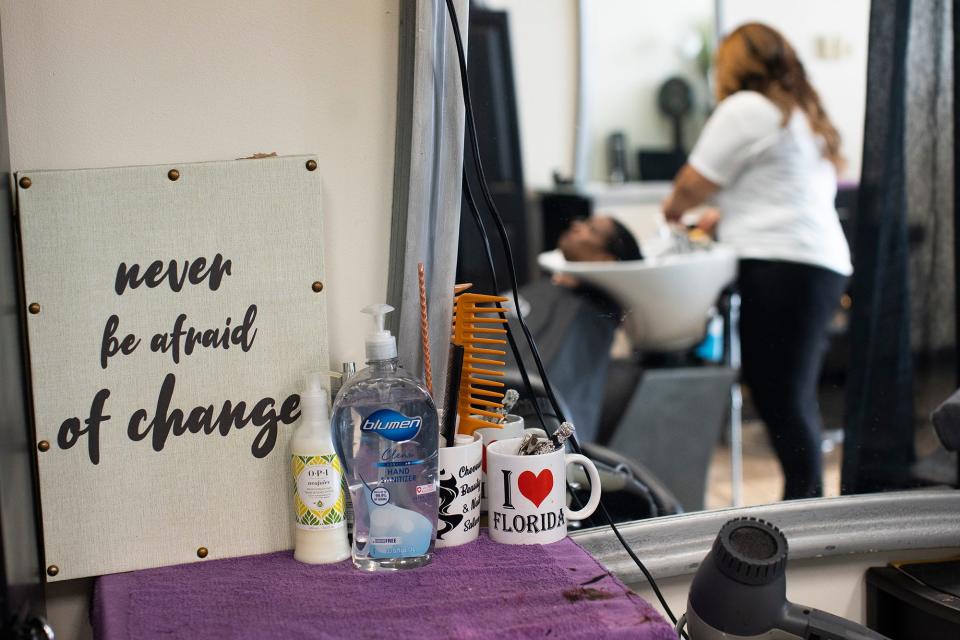
Livingston, who is Black, had grown accustomed to wearing her hair straight at work because she felt it was “socially acceptable.” That day, though, she wore her naturally curly hair in a high ponytail. The physical violation by her white colleague only reinforced that she couldn’t be comfortable as her authentic self.
Related news: 20 Black-owned businesses you can support in the Columbus area this Juneteenth
But things are changing.
CROWN Act aims to end discrimination based on hairstyle or hair texture
The murder of George Floyd and subsequent racial justice protests have prompted more discussion of racism and microaggressions in corporate America.
And in March, the U.S. House of Representatives passed the CROWN Act (Creating a Respectful and Open World for Natural Hair Act), prohibiting racial discrimination based on hairstyle or hair texture. The legislation has also been introduced in the U.S. Senate, which has not voted on it. Columbus passed a similar CROWN Act in 2021, while Ohio lawmakers introduced their own legislation in May.
Help support quality local journalism like this. Click here to subscribe
Amid this shifting environment, more Black women are feeling comfortable wearing their hair in its natural state, or in cultural and protective styles previously forbidden or critiqued in workplaces.
“The walls are starting to break down,” Livingston said. “Being who you are and feeling comfortable within your own skin is now becoming the norm.”
Several years removed from the incident, Livingston has a new job as an assistant vice president and senior counsel at JPMorgan Chase. She now wears her hair in locs that are often pulled into two side-buns.
“When I go into a Zoom meeting and somebody’s like, ‘She’s rocking her power buns today,’ or if I’m walking down the hallway at Chase and people are like, ‘Her space buns are so cool' — I don't think people realize the power that those positive comments have had,” she said. “It honestly makes me a little emotional because that hasn't always been my experience.”
In previous corporate environments, Livingston said she was bombarded by questions.
Video: Wearing her natural hair in corporate environments
“Is that your real hair? Can you wash your hair? How regularly can you wash your hair?”
Though people are just curious, the questions can be uncomfortable, Livingston said.
“You’re essentially asking me about my personal hygiene,” she explained. “I would always keep it pretty professional, because I feel the only way that you can break down walls and barriers as it relates to cultural understanding is to educate people.”
Livingston said her decision to embrace her locs came as she was giving her adult sons advice about entering the workforce. She initially cautioned them against wearing locs or braids, fearing they would be unfairly judged.
“(I realized) I was asking them to suppress who they are,” she said. “Honestly, it made me sad, and I resolved that we should be proud to be who we are. We have to let our confidence, competence and credibility speak for itself, and that should be good enough for any employer.”
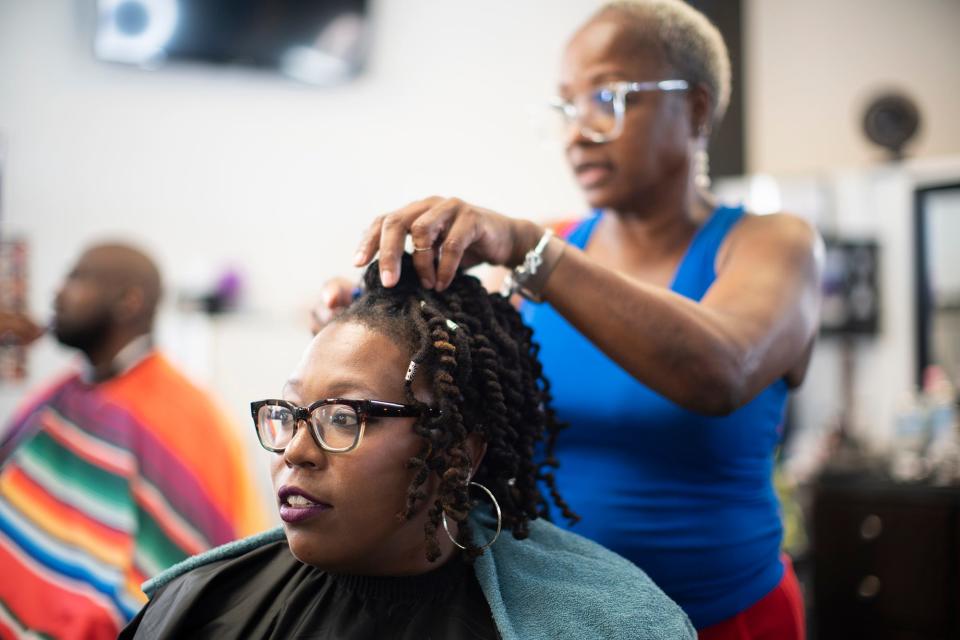
Resources for Black women: A guide to certification for women- and minority-owned businesses
Discriminatory policies against Black hair
For many years, Black people were shut out of educational and employment opportunities based on policies prohibiting so-called “unkempt” hairstyles, such as locs, cornrows, twists, braids, Bantu knots or afros.
The U.S. Army, for example, banned locs until 2017, and enforced rigid rules on the style of braids, twists and cornrows before loosening the restrictions in 2021.
The styles are not only cultural, but many also are designed to retain moisture and protect the ends of the hair from the elements.
In recent years, videos of school and athletic officials ordering Black students to cut their hair have circulated on social media.
Entrepreneur and educator Erika Pryor compared the hair discrimination to other racialized policies prohibiting items such as oversized clothing and hoodies.
“The other thing that we've been able to unpack since George Floyd is that the responsibility of racism doesn't (lie) with Black people,” said Pryor, 44, of the Southwest Side, who founded EPiC Creative and Design, a marketing and creative services agency.
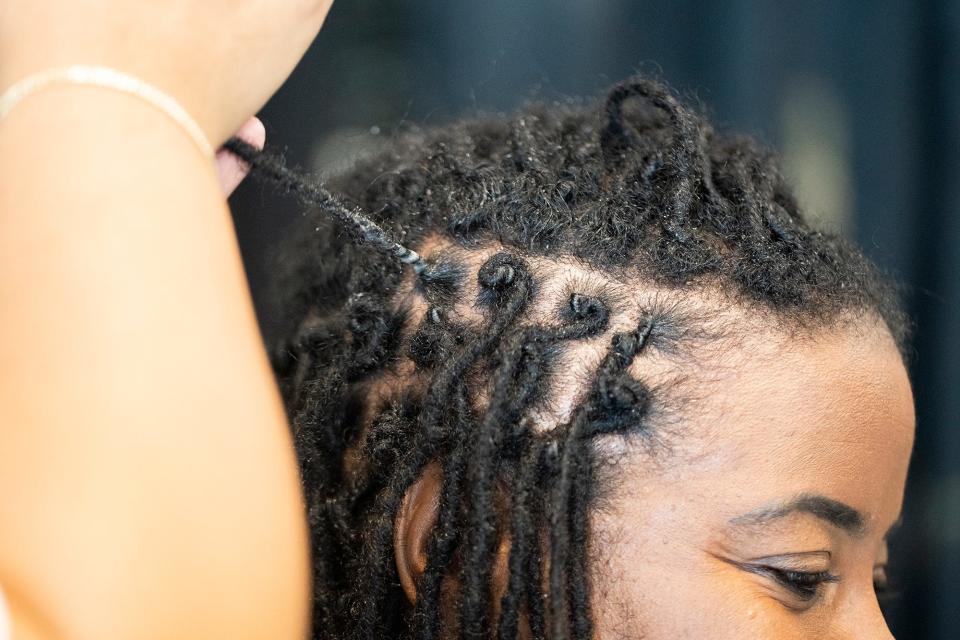
“We’re not responsible for creating racist policies. We're not responsible for enacting racialized institutional systems. So, I do feel there’s been an evolution in the conversations about race, even as it relates to hair and skin tone and style of dress.”
Pryor, who is Black, wears her hair in locs with an undercut, or cut very short on each side. She said she didn’t receive negative comments about her hair when she taught communication courses at the college level.
But that changed when she took corporate and nonprofit jobs.
“People were very uncomfortable,” she recalled.
“(One time), I was called to meet with the HR manager. And they wanted me to engage in coaching so that I could be a better team member because my hair was distracting people. My dress was distracting. There were numerous complaints, but all of them were about my physical appearance. None of the complaints were about my work or anything related to my actual job.”
Although Pryor believes things are changing for the better, her 8-year-old daughter is still experiencing discomfort in school because she also wears her hair in locs.
“She tells me, ‘People were touching my hair and I've asked them not to,’” Pryor said.
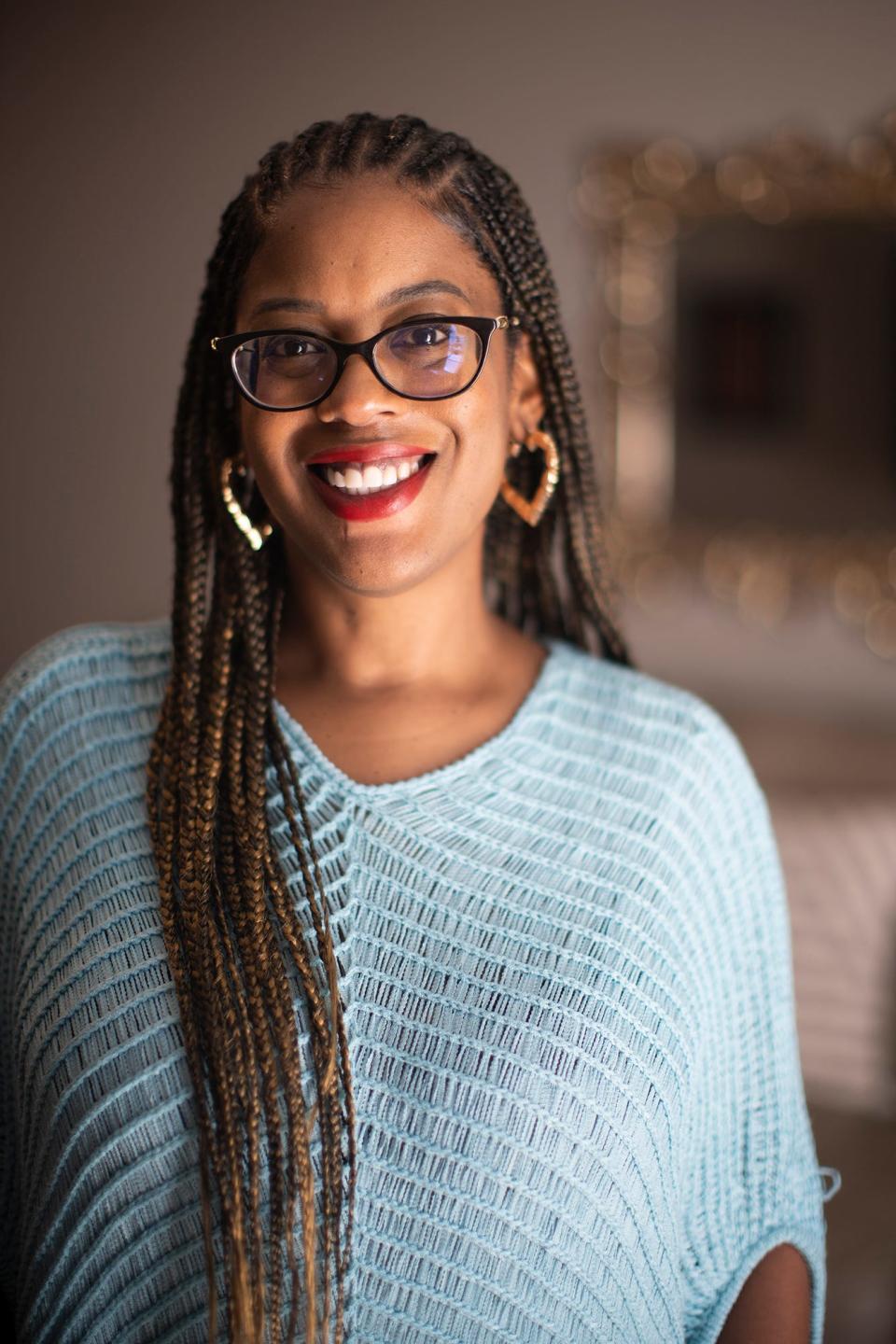
Her daughter also said she and a white student both got milk in their hair, but only her classmate was permitted to go to the bathroom to get it out.
"They said, 'Tell your mom to take care of it,' " Pryor said. "Just because they don't know how to care for your hair doesn't mean that you don't know how to care for your hair.”
Pryor also said that, as long as Black people innovate, they will likely face initial barriers.
“Black women and people of color are the trendsetters,” she said.
“Now that white people feel more comfortable with (current hairstyles), we can relax a little bit. But the next trend that we put out there, we can expect that we will get that backlash until we see some greater level of acceptance.”
More: An open letter to Columbus' Black girls from Black women who love them
Criticism within the Black community
Sometimes, Black people struggle to gain acceptance within their own demographic.
Columbus real estate agent Stefphanie Galloway said both family members and romantic partners have encouraged her to wear her hair straight.
And early in her career, a well-meaning friend suggested that she do something about her “wild hair.”
“It wasn't like she talked to me in a negative tone, because she was really coming from a place of love,” said Galloway, 46, of Canal Winchester, an agent with Coldwell Banker Realty. “But it was like, 'You'll be more successful, should you tame it a little bit more, put it away, put it back, not have it be the center of attention.'”
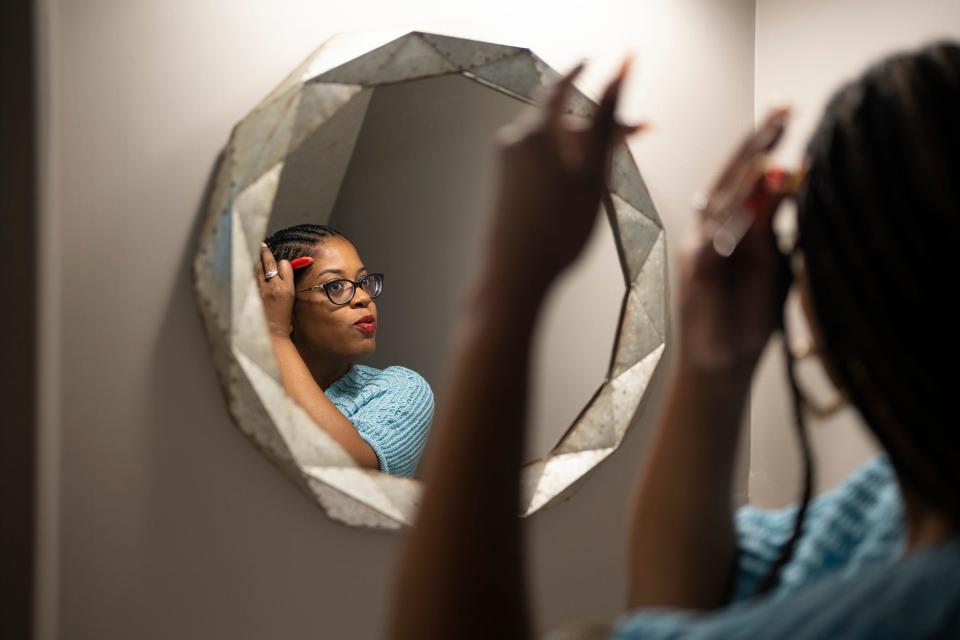
Galloway also said her parents and grandmother are not fans of her natural hair.
“They're from another generation, where it was not favorable to wear your hair like this,” she added.
“You were considered a ‘good Negro,’ someone who could be trusted, or that you could present in front of white people. The more-Caucasian you looked, the more acceptable you were. My family has those deep-rooted Southern traditions and values that are, unfortunately, still weighing on our backs and preventing us from just being who we are. And I'm glad I let it go.”
After several years working in marketing and promotions for the city and local companies, Galloway has found freedom in being her own boss. She often wears her hair in braids, and feels comfortable expressing herself with long, colorful acrylic nails.
“It's been amazing,” she said. “I felt like there were so many layers of myself that were just tucked away.”
Galloway also said wearing braids saves her time.
“This is convenient for me, to be able to take care of my hair without unnecessary trips to the salon just because I feel like I have to fit in,” she said. “It became like a chore.”
Galloway supports the Crown Act, but believes young people will truly advance hair acceptance in the workplace by demanding a more inclusive environment.
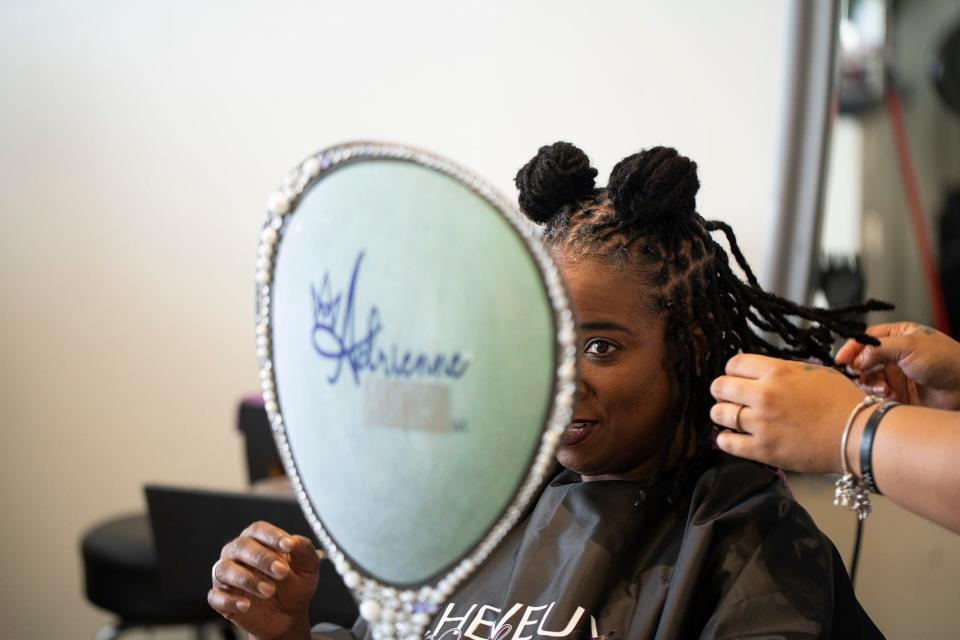
“People that don't look like me, I hope they realize just how much we carry with our hair,” she said. “They think it's just a style, but over the years, it's been a way to be accepted. Now, we're accepting ourselves and we just hope everyone else does, too.”
ethompson@dispatch.com
@miss_ethompson
This article originally appeared on The Columbus Dispatch: More Black women choosing to wear natural hairstyles in the workplace
